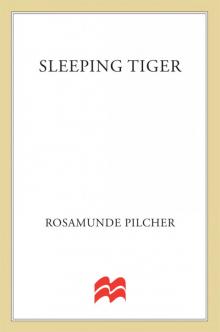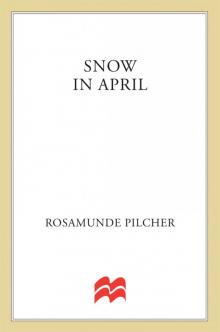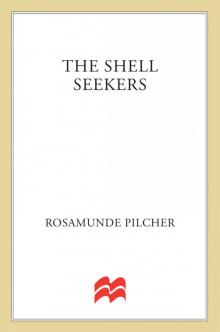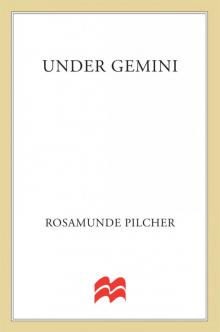- Home
- Rosamunde Pilcher
Sleeping Tiger Page 6
Sleeping Tiger Read online
Page 6
Tomeu laughed. “Sí. Muy grande.”
“It’s Señor Dyer’s cat?”
“Sí. Señor Dyer.”
She went to join him, leaning out over the wall. There was a little triangle of rocky garden with a gnarled olive tree or two, and Selina realised that, like any house built on a steep slope, the Casa Barco went in stages and the terrace was, in fact, the roof of a boathouse, with slipways which ran down to the water. A flight of steps led from the terrace to the lower level, and directly below them two men squatted, cleaning fish. Their knives sliced precisely, the blades glinting in the sunlight. They rinsed the fish in the sea, stirring up the still, jade water. Tomeu stooped to pick up a chip of stone, and threw it down at the men, and the two faces turned up to see who it was, and saw Tomeu and smiled.
“Hombre, Tomeu!”
He replied with some impudent back-chat, for they laughed and then went back to their work. Beneath Selina’s hands the stone wall was warm, and some of the white-wash had smudged off on to the front of her dress, like chalk from a blackboard. She turned to sit on the wall, with her back to the sea, and saw the washing-line, slung between two hooks, with a row of bone-dry wrinkled clothes. A faded blue work-shirt, a pair of bathing-trunks, some white ducks with patches on the knees, and a pair of old tennis shoes worn to a shred and tied over the line by their laces. The terrace also sported a few articles of furniture, but not the House & Garden type. A ratty old cane chair and a wooden paint-chipped table and the sort of booby-trap deck-chair that collapses when you sit in it. She wished that she could speak Spanish and talk to the friendly Tomeu. She wanted to ask about Señor Dyer. What sort of a man was he? Which of the yachts was his? When did Tomeu think he would be back from San Antonio? But before she could start up any sort of communication with him, the sound of Toni’s returning taxi came like a knell of doom. It stopped by the door and in a moment Toni came into the house, looking ill-tempered and more villainous than ever. Selina had to tell herself that he couldn’t eat her. She said, firmly, “Señor Dyer is not back.”
Toni received this information in frigid silence. Then he produced a toothpick and delved about at a troublesome back molar. He wiped the toothpick on the seat of his pants, put it back into his pocket and said, “What the hell we do now?”
“I shall wait here. He can’t be long. Rudolfo said that he wouldn’t be long. And you can either wait here too, or you can leave me your name and address and return to San Antonio. Either way I shall see that you get paid.”
Unconsciously she spoke in her grandmother’s voice, and to her own surprise, it worked. Toni resigned himself to the situation. He sucked his teeth for a moment or two more and than announced his decision.
“I shall wait too. But not here. At the hotel.”
There was cognac at the hotel and he could have a siesta in the taxi, beneath the shade of the tree. It was half past two already and he did not enjoy being awake at half past two. “When Señor Dyer is here, you can come and tell me.”
Selina could have hugged him in relief, but she only said, “Very well, I’ll certainly do that.” And then added, because he looked so despondent, “I am sorry this has happened, but it will be all right.”
He shrugged hugely, sighing, and went back to his car. They heard him start up and drive back over the hill towards the Cala Fuerte hotel. Selina had time to think “Poor Rudolfo,” and then she went back to Tomeu.
“I stay here,” she told him.
He frowned. “Usted aquí.”
“Yes. Here.” She pointed to the ground. Tomeu grinned his comprehension and went to collect his empty baskets.
“Good-bye, Tomeu, and thank you.”
“Adiós, Señorita.”
He was gone, and Selina was alone. She went out on to the terrace and told herself that she was waiting for her father, but it was still not quite believable. She wondered if he would know, without being told, who she was. And if he did not know, she wondered how she would tell him.
It was very hot. The sun beat down on to the sheltered terrace, and she could not remember ever having been so hot. Her nylon stockings and her leather shoes and her woollen dress became, all at once, unbearable. They were no longer sensible, but unsuitable to a degree that was lunatic.
But Grandmother couldn’t stand bare legs, even with a summer dress, and gloves she considered essential. You can tell a lady by her gloves. Such an untidy-looking gel, going about without a hat.
But Grandmother was dead. Loved, mourned, but undoubtedly dead. The voice was stilled, the dogmatic opinions would never be uttered again, and Selina was on her own, to do what she wanted, in her father’s house and a world away from Queen’s Gate. She went into the house, and stripped off her stockings and her shoes, and then, feeling cool and delightfully free, went in search of food. There was butter in the refrigerator, and she put some on a slice of bread, and took a tomato and a bottle of cold soda water. This picnic she ate on the terrace, perched on the wall, and watching the boats in the harbour. Afterwards, she began to be sleepy, but she did not want to be found asleep. There was something very unguarded about being found asleep. She would have to sit somewhere hard and uncomfortable and stay awake.
In the end, she climbed the ladder to the gallery and settled herself, in a certain amount of discomfort, on the top step. After a little, the huge white cat came in out of the sun, and climbed up to settle himself, with an inordinate amount of purring and treading paws, on Selina’s knee.
The hands of her watch went slowly round.
5
Frances Dongen said, “I can’t think why you have to go.”
“I’ve told you; I have to feed Pearl.”
“Pearl can feed herself. There are enough dead fish around that house of yours to feed an army of cats. Stay another night, darling.”
“It isn’t just Pearl; it’s Eclipse as well.…”
“But she’s ridden out one storm.…”
“I don’t know that she has ridden it out, and the bad weather’s coming back.…”
“Oh, well,” said Frances, and reached for another cigarette. “If that’s how you feel, you’d better go.”
Her mother had told her, years ago, when she was a girl in Cincinnati, Ohio, that the best way to keep a man was to give him the impression, at least, of being free. Not that she had yet reached the stage of keeping George Dyer, because she hadn’t even got him yet, but she was an old hand at this fascinating game of stalk and counter-stalk, and she was prepared to take her time.
She was sitting, on the small terrace of her house, high in the old town of San Antonio. Above, only a few hundred yards or so separated her from the cathedral, and below, a maze of winding cobbled streets, tall, narrow houses, and endless strings of washing, spilled to the wall of the old fortifications. Beyond the wall lay the new town, wide streets and tree-lined squares leading to the harbour, filled with island schooners and white, tall-masted yachts, and the steamer, which had just arrived on its weekly trip from Barcelona.
For two years she had lived in this delectable spot, ever since she had arrived in the cruising yacht of some wealthy American friends. After six weeks of their company, Frances was bored stiff, and when they all came ashore for a party, she never left again. After a three-day binge, she had woken to a monumental hangover and a strange bed, and the realisation that the cruising yacht and all its occupants had left without her.
This troubled Frances not in the least. She already seemed to have made a lot of new friends, she was rich, twice-married, without roots. San Antonio suited her down to the ground. It was filled with painters, expatriates, writers and beatniks, and Frances, who had once lived for several months with an unsuccessful artist in Greenwich Village, felt entirely at home. Before long she had found this house, and when the initial occupations of settling-in were over, cast about for some way of filling in her time. She decided upon an art gallery. In a place where you had both resident painters and visiting tourists, an art gallery was surely
a blue-chip investment. She bought up a disused fish-market on the harbour, converted it, and managed the business with an acumen she had inherited not only from her father, but from her two ex-husbands as well.
She was not nearly forty, but everything about her belied the passing of years. Tall, very thin, tanned like a boy, with her blonde head a tangle of artless curls, she wore, and got away with, the sort of clothes normally reserved for teenagers. Tight pants, and men’s shirts, and bikinis that were no more than a couple of knotted handkerchiefs. She chain-smoked, and she knew she was drinking too much, but most of the time, and this morning in particular, life was just as good as she’d always meant it to be.
The party last night, thrown in honour of Olaf Svensen’s first exhibition, had been particularly successful. Olaf was the dirtiest young man ever seen, even by San Antonio standards, with a scrofulous beard and toe-nails that scarcely bore looking at, but his pop-art sculpture was guaranteed to open eyes, and Frances took a certain mild pleasure in shocking the public. George Dyer had certainly been asked to the party—since the publication of his book he had become something of a celebrity—but that was no guarantee that he would come, and Frances’s spirits had soared in pleasure when she saw him come through the door and start to thread his way towards her through the crowded smoke-filled room. He told her that he was in San Antonio to pick up a spare part for his boat, and after hearing his comments on Olaf’s work, she knew that he had only come to the party for the free drink, but what did it matter provided he was there, and what was more, had stayed, right to the end of the party, and then afterwards, with Frances. She had known him, now, for about a year. Last spring, she had driven over to Cala Fuerte to look at the work of a young French painter who lived there. She had wound up, inevitably, in Rudolfo’s bar, standing the painter a string of martinis, but when George Dyer walked in, she had abandoned the Frenchman, who went to sleep with his head on the table, and started to talk to George instead, and they ended up having lunch together, and were still drinking coffee at six o’clock in the evening, when it was time to switch back to brandy again.
He usually came to San Antonio about once a week, to pick up his mail from the Yacht Club, and go to the bank, and stock up on supplies for his boat, and on these occasions he nearly always looked Frances up, and they would have dinner, or attach themselves to some party already in full swing in one of the waterside bars. She was enormously attracted by him—more so, she knew, than he was to her, but this only served to make him all the more desirable. It made her jealous, too, of his other interests, of anything that kept him away from her. His writing, his yacht, but most of all the self-contained existence he led at Cala Fuerte. She would have liked him to need her, but he seemed to need nothing. He was unimpressed by her money, but delighted in her coarse and very masculine sense of humor. Watching him now, she thought, with satisfaction, that he was the first real man she had met in years.
He was getting ready to go, packing the things he had bought into a basket. Just watching his brown hands perform this homely task made Frances ache with physical desire. She said, against her better judgment, but hoping to make him stay a little longer, “You’ve had nothing to eat.”
“I’ll get something at home.”
At home. She wished this were his home. She said, “A drink?”
He laughed, and looked up at her, distinctly bloodshot and amused as hell. “Look, ducky, I have a three-hour drive.”
“A drink wouldn’t kill you.” She wanted one herself.
“No, but a ruddy great truck might, after I’d gone to sleep.”
The basket was packed. He stood up and said, “I must go.”
Frances stood too, stooped to stub out her cigarette and went to help him with his things. He lifted the heavy crate with the spare propeller, and Frances carried the basket, and led the way down the stone stairs to her enclosed courtyard, where the lemon tree grew by the well. She opened the heavy double doors that led to the narrow street, and stepped out in the sunshine. Here, on the crazy slope of the hill, George’s ridiculous car was parked, an ancient Morris Cowley, with yellow wheels and a hood like a perambulator. They loaded it up, and George turned to say good-bye.
“It’s been fun,” he said.
“That’s because we didn’t plan it, darling. What’s the word? Spontaneous.” She kissed his mouth. She was so tall that she did not have to reach up to do it, merely leaned forward and caught him unawares. She wore a bright, thick lipstick that came off on his mouth and tasted sweet, and when she drew away, he wiped the stain away on the back of his hand.
He got into the car.
“Good-bye, darling.”
“’Bye, Frances.”
“’Bye.”
She removed the stone which, last night, feeble with laughter, they had jammed beneath the front wheel, and George took off the brake and the car free-wheeled away, gathering terrifying speed as it went, and taking the corners of the narrow, steep street like a helter-skelter at the fair, scattering cats and chickens and causing the Guardia Civil, posted at the gate of the old wall, to suck their teeth in violent disapproval.
He bowled back to Cala Fuerte, down the dusty roads, through the neatly-tended fields, past the windmills, and the patient horses turning the water-wheels. He came to the winding road beneath the mountains, and the cross of San Estaban towered above him. He squinted out to sea for signs of the returning storm, and he thought about Frances. He thought of going to live in San Antonio with Frances, if only for the satisfaction of writing to Rutland, the publisher, and telling him to go to hell, he wasn’t going to write any more books, he was going to become a beachcomber, a lotus-eater, he was going to be kept by a rich American.
At San Estaban, the siesta was over, the shutters had been thrown wide and a few peaceful customers sat outside the cafés. As George passed, tooting the horn of the car, they called “Hombre!” and waved, because they all knew him, if not by name, then by sight, because he was the mad Englishman in the little car with yellow wheels, who drove around the island wearing a yacthing cap and sometimes wrote books.
As he came free-wheeling down the last stretch of road that led to Cala Fuerte, he had a small debate with himself as to whether or not he would call in at Rudolfo’s for a drink. In the end, rather to his own surprise, he decided against it. He would undoubtedly meet friends, would stay longer than he intended, would drink more than was good for him. He did not trust the weather, and Pearl would be hungry; so instead, he compromised with a friendly toot on his horn as he came through the square, and a genial wave to anybody who might be sitting on the terrace of the Cala Fuerte. There was no sign of Rudolfo, but one or two startled drinkers waved back, and there was the good feeling of coming home, and George began to whistle.
* * *
He was whistling when he came into the house. Selina, still sitting on the ladder, heard the car come over the hill, and down the slope, and stop, with a great screeching of ancient brakes, outside the Casa Barco. She sat motionless, the white cat, a great, heavy weight, asleep in her lap. The car engine was switched off, and it was then that she heard the whistling. A door opened and was slammed shut. The whistling continued, grew louder. The door of the Casa Barco was pushed open, and a man came in.
He carried a basket in one hand, a cardboard box under the other arm, and a roll of newspapers in his teeth. He shut the door with the seat of his pants, put the basket down on the floor, took the papers out of his mouth and dropped them into the basket, and then carried the box to the table by the typewriter and set it carefully down. She couldn’t see his face, because it was obscured by the peak of his battered, faintly sea-going cap, but he opened the top of the box, and checked, amongst paper shavings, on the contents. Seemingly content, he then picked up the binoculars and disappeared out on to the terrace. Selina sat still, where she was, but the cat began to wake up. She stroked it, partly out of nervousness, and partly because she didn’t want it to move. After a little, he came back int
o the house again, laid down the binoculars and took off his cap and threw it down on the table. He had dark hair, very thick and just beginning to be run through with grey. His shirt was the faded blue one of any farmer, his pants washed-out khaki denim, his shoes a pair of dusty espadrilles. Still whistling, he went back to collect the basket and take it into the galley, disappearing once more from Selina’s view. She heard him open and shut the refrigerator door, there was the sound of a bottle being opened, the chink of glass, the pouring of a drink. When he appeared once more he was carrying a tumbler of what looked like soda water. He went back out on to the terrace and called “Pearl!” The cat began to stretch its legs. “Pearl! Pearley!” He made seductive kissing noises. The cat mewed. He came back into the house. “Pearl.”
Selina ran a tongue over her lips, took a deep breath, and said, “Are you looking for the cat?”
* * *
George Dyer stopped dead in his tracks and looked up and saw the girl, sitting at the top of the steps. She had long bare legs and bare feet, and Pearl, like a huge white fur cushion, lay on her knee.
He frowned slightly, trying to remember. He said, “Were you there just now, when I came through?”
“Yes.”
“I never saw you.”
“No, I know you didn’t.” He told himself that her voice was very well modulated, very nicely brought up. She went on, “Is Pearl the name of your cat?”
“Yes, I came back to feed her.”
“She’s been sitting on my knee all afternoon.”
“All after— … How long have you been here?”
“Since half past two.”
“Half past two?” He glanced at his watch. “But it’s past five o’clock.”
“Yes, I know.”
Pearl now took a hand in the conversation by sitting up, stretching, uttering another plaintive mew, and springing lightly out of the girl’s lap and down the steps. Purring like a kettle, she wrapped herself around George’s legs, but for once was ignored.

 Wild Mountain Thyme
Wild Mountain Thyme Sleeping Tiger
Sleeping Tiger Flowers in the Rain & Other Stories
Flowers in the Rain & Other Stories September
September The Blue Bedroom: & Other Stories
The Blue Bedroom: & Other Stories The Carousel
The Carousel The End of Summer
The End of Summer Snow in April
Snow in April The Shell Seekers
The Shell Seekers Under Gemini
Under Gemini The Empty House
The Empty House The Day of the Storm
The Day of the Storm Another View
Another View Voices in the Summer
Voices in the Summer The World of Rosamunde Pilcher
The World of Rosamunde Pilcher Voices In Summer
Voices In Summer Blue Bedroom and Other Stories
Blue Bedroom and Other Stories